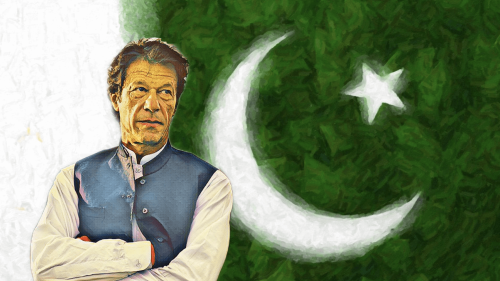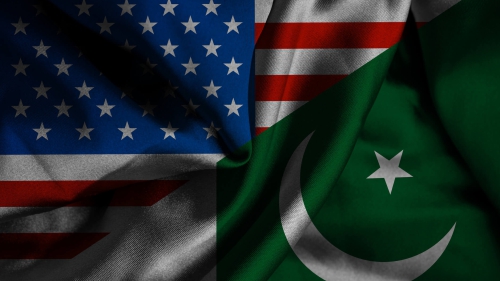The only way to address poverty
General Musharraf has solemnly committed himself to poverty alleviation and elimination of Islam from politics. Interestingly, the more the General runs away from Islam, the more we find real solutions to almost all of our problems in Islam. Poverty is presented as a problem that has never been successfully addressed. In fact, it is not that poverty has yet to be understood; it is because the right approach has not been applied.
The roots of poverty are not in the community at the grassroots level. Poverty is essentially a socio-political product of the systems imposed from the top -- at national and international levels. For instance, the roots of poverty are in the system under which millions of rupees from the public funds are being spent on referendum but a government office, just 100 meters from the Chief Executive Secretariat in Islamabad, cannot afford to mail a letter due to shortage of fund. Like many other government departments, this department has been notified not to utilize more than 37 percent of its allocated budget. As more and more people rise against the tyrannical capitalist systems in the developed world, we are fast embracing the same defunct systems.
The capitalist formula is about import liberalization, i.e. to free up trade, let all imports in, and then the competition will make developing industries more competitive with developed industries. The IMF demands of a country in trouble to earn more and spend less. "Earn more," means export more, devote resources to export production and not to production for local needs. "Spend less," means cut budgets, cut state expenditures, make bank credit scarce and expensive.
General Musharraf is following this formula. It's the common man who is hurt because prices go up; food subsidies are abolished; transport becomes more expensive; electricity, gas, and other basic services go up; and then education, and health budgets practically disappear. All this doesn't hurt the elites much because they can afford private services. The idea that all countries can find a niche and something to export more easily and at less cost than others doesn't work because there are already monopolies and the debtor countries are now exporting abnormally high amounts of goods.
We rush for export because we won't get any money unless we follow the instructions. So, several dozen countries at once have to export the same limited range of goods in competition. As a result, the price goes down, we try to export even more and there is the most terrific glut and slump in commodity prices. This of course is the recipe for disaster. But the IMF insists everyone can profit from a comparative advantage. For that, we have to be able to diversify our economy, which requires more money. There's no spare cash. So prices get lower and lower, and the little that is earned goes into debt service. There isn't any new investment, and it's just a complete never-ending downward spiral.
The capitalist dictated solutions for poverty alleviation are simply to moderate the pain, not to let anyone off the hook. The problem is that even if all the debt were written off, the poor wouldn't automatically benefit from debt relief because there is so much power in the hands of the elite, who maintain the status quo at national levels. Undoubtedly, mismanagement and mis-allocation of funds are the two main causes of poverty in countries like Pakistan, where the poor are getting poorer and the rich richer with each passing day.
Structural adjustment programs are often beneficial to local elites, providing them with such advantages as rock-bottom wages and opportunities for buy-ups of privatized companies; they are happy to cooperate. The wholesale poverty alleviation programs only sustain the predicament. A rethinking of poverty alleviation strategies is needed without any dictation of solutions from abroad. As long as the root causes of poverty at the upper levels rema levels remain intact, poverty cannot be solved using one blanket approach -- providing everyone with soft loans. The international donor community, including the World Bank and Asian Development Bank continue showering people with micro-credit expecting them to recover and show an increased consumption rate.
The international donor community is generally insensitive to the context of our poverty problems and continues to judge the situation according to the macroeconomic management --which speaks only about fiscal and monetary policies whose instruments, ultimately, are loans and interest, or as recently happened some donors (Swiss) are directly providing funds to political parties (ANP in NWFP, Bugti Group in Baluchistan, ML (Q) in Punjab and MQM in Sindh) for development without any clear criteria and against to devolution of power plan -- the elected members would be watching, whereas the unelected members of other parties would be undertaking community development schemes. This is absolutely incomprehensible and unprecedented political bribery.
This means that we need to rethink our strategy in poverty alleviation, we need to study and develop the potential to overcome our poverty, which seems to have expanded as well as deepened, because of the 1. Lack of a comprehensive approach; 2. Following donor's agenda without its relevance to the local conditions; 3. High social, political and economic inequality, and 4. High inflation relative to rise in income for fixed income groups.
The lately embraced, micro-credit based approach is considered as the final solution. This is akin to gagging the poor with a few thousand rupees and leaving the exploitative systems intact for perpetuating poverty. Being Muslims, our poverty alleviation strategies cannot be alienated from our ideological moorings. Like every other problem, we are looking for secular solutions to the poverty problem while the Islamic way of life is a constitutional requirement under Article 31 of the Constitution of Pakistan.
We need to understand the epistemological significance of poverty as defined and understood in Islam. Faqir (poorest of the poor) and Miskeen (whose legitimate needs exceed his means) are the two basic classifications of poor in Islam. Contrary to the interest based cosmetic approach, the Islamic way of poverty alleviation focuses on developing human resource (tadreeb) and providing relevant job opportunity. The institutions identified for financial assistance to the poor are assistance (Kifalah) by: the nearest kith and kin; the neighbors under neighborhood rights; others in the form of mandatory charity like Zakat; and through temporary and permanent endowments. Moreover, an Islamic State is bound to provide sustenance to its citizens irrespective of their religion. The State meets this responsibility by collection of Zakat, other emergent charities and raising taxes.
The enormity of such relief to the poor under Islam cannot be disputed. Instead of taking religion out of our public life, if we focus on integrating Islamic principles in our daily life, the social response to poverty, irrespective of the involvement of the State, would be far more supportive than all the donated funds together. Zakat and Bait-ul-Mal are the two institutions, which, if used properly, can address the problem of poverty to a great extent. The institution of Bait-ul-Mal has tremendous potential for reaching the poor and helping them to escape the poverty trap without engaging in the curse of micro-credit. An assessment of both Zakat and Bait-ul-Mal in terms of their mis-utilization and rehabilitative contribution is urgently required.
The importance of Islamic arrangements for poverty alleviation lies in the fact that the poor cannot afford loans at 20-25% interest rate, which either make them defaulters or the staff of concerned organizations get involved in corruption by showing funds reserved for other purposes as recovery o,f the micro-credit. More than 70 per cent rural population depends mainly on agriculture. The land tenure system is a colonial legacy. India addressed this problem in the initial few years, but the impact of land reforms in Pakistan, introduced on three occasions, has been less than structural. Instead of addicting more and more poor to micro-credit with no significant change in their poverty status, it is better for an authoritative regime, like Musharraf's, to introduce revolutionary land reforms and address the poverty problem on long-term basis.
Instead of purely relying on interest-based loans, programs like Pakistan Poverty Alleviation Fund and Khushhali Bank need to look into the Islamic ways, like Mudariba, Musharika, Khumus, etc for supporting the needy. The work opportunities through mega projects as described by the General in every speech are not going to address the suffering of millions living in remote regions, where cottage or rural industries need to be promoted on priority basis.
Pakistan introduced Zakat and Ushr ordinance in 1980. The collection of Ushr, a percentage of land produce, has not been very satisfactory because it is being done through the Land Revenue Administration which, as a legacy of the colonial days, is not tuned to such a revolutionary concept of an Islamic welfare State. However, if the legislation is enforced in letter and spirit, poverty will find no spawning grounds and the poor and the needy will be integrated with the rest of the society. There is also a need to introduce a representative system for the collection and utilization of Zakat. The new decentralized local government system can play a vital role in local collection and disbursement to the local poor. This would build social cohesion as well.
The ongoing poverty alleviation measures show that despite the fact that markets do not eliminate poverty, because they tend to move new wealth away from poor communities, most NGOs and the government follow the capitalist market doctrines. They secure dividends by concentrating investments in relatively favorable environments. The poorest people in the poorest places have thus disappeared in practice - if not in ideology and publicity - from NGO net-works and government programs, almost as surely as they vanished from private marketing surveys and business plans. Without coming back to Islam for finding solutions to our problems, we may never achieve the lofty goals that we set for ourselves - whether they are in the field of poverty alleviation or any other aspect of our collective and individual lives. The problem is that we are not ready to even give it a thought because the pockets in which we have put our hands for survival are leading us in exactly the opposite direction.
Abid Ullah Jan is a columnist for The Statesman, The Nation, and the Pakistan Observer (Pakistan). He is also sub-editor for the Tribune International (Sydney, Australia), and is the Executive Director of the Integrated Regional Support Programme (IRSP).
Topics: Business, Pakistan, Pervez Musharraf, Poverty And Welfare
Views: 1571
Related Suggestions

















